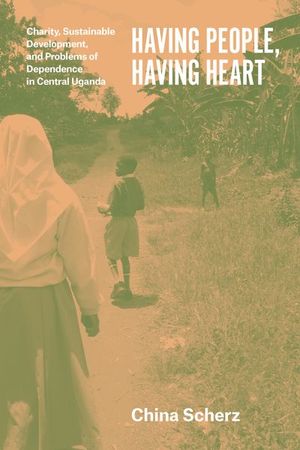Having People, Having Heart
Published by The University of Chicago Press
This study of charity in Uganda “challenges current international development norms and standards . . . as . . . refusals to redistribute wealth” (Washington Post).
Believing that charity inadvertently legitimates social inequality and fosters dependence, many international development organizations have increasingly sought to replace material aid with efforts to build self-reliance and local institutions. But in some cultures—like those in rural Uganda, where Having People, Having Heart takes place—people see this shift not as an effort toward empowerment but as a suspect refusal to redistribute wealth. Exploring this conflict, China Scherz balances the negative assessments of charity that have led to this shift with the viewpoints of those who actually receive aid.
Through detailed studies of two different orphan support organizations in Uganda, Scherz shows how many Ugandans view material forms of Catholic charity as deeply intertwined with their own ethics of care and exchange. With a detailed examination of this overlooked relationship in hand, she reassesses the generally assumed paradox of material aid as both promising independence and preventing it. The result is a sophisticated demonstration of the powerful role that anthropological concepts of exchange, value, personhood, and religion play in the politics of international aid and development.
“At once ethnographically complex and exceptionally well argued . . . [Scherz] offers the kind of analysis of the politics and morality of aid in the contemporary world that reminds us why anthropology remains a crucial discipline going forward.” —Joel Robbins, University of Cambridge
“A radical revaluation of the term ‘dependence.’” —Books & Culture
Believing that charity inadvertently legitimates social inequality and fosters dependence, many international development organizations have increasingly sought to replace material aid with efforts to build self-reliance and local institutions. But in some cultures—like those in rural Uganda, where Having People, Having Heart takes place—people see this shift not as an effort toward empowerment but as a suspect refusal to redistribute wealth. Exploring this conflict, China Scherz balances the negative assessments of charity that have led to this shift with the viewpoints of those who actually receive aid.
Through detailed studies of two different orphan support organizations in Uganda, Scherz shows how many Ugandans view material forms of Catholic charity as deeply intertwined with their own ethics of care and exchange. With a detailed examination of this overlooked relationship in hand, she reassesses the generally assumed paradox of material aid as both promising independence and preventing it. The result is a sophisticated demonstration of the powerful role that anthropological concepts of exchange, value, personhood, and religion play in the politics of international aid and development.
“At once ethnographically complex and exceptionally well argued . . . [Scherz] offers the kind of analysis of the politics and morality of aid in the contemporary world that reminds us why anthropology remains a crucial discipline going forward.” —Joel Robbins, University of Cambridge
“A radical revaluation of the term ‘dependence.’” —Books & Culture
BUY NOW FROM
COMMUNITY REVIEWS

